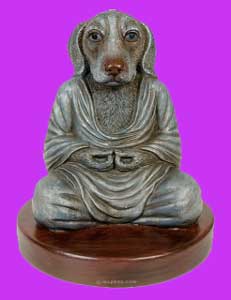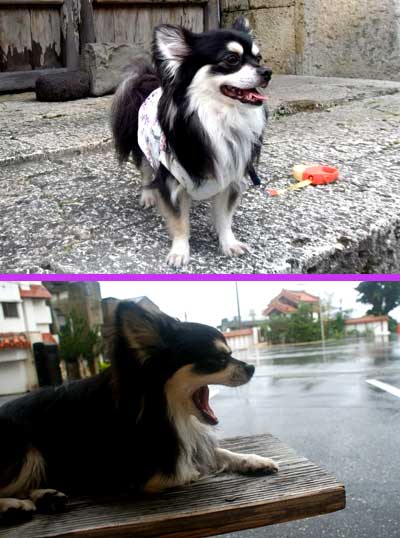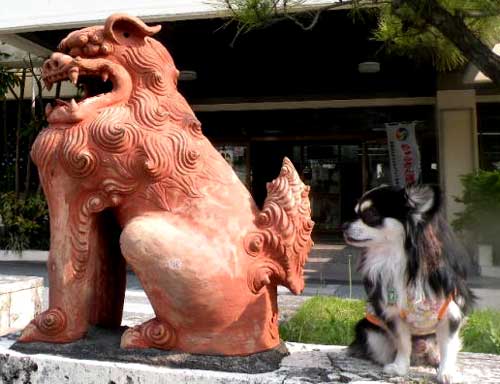
I spent formative years in a Buddhist household, my step-mother having been raised from age five in a Buddhist monastery, becoming a bikuni or nun. She was the spiritual guide for many peasant girls from Thailand living in Seattle.
Her influence on my life was profound and one of the few truly good aspects of an often terrifying childhood, which had scarsely been worth living before her arrival. And so I take a special delight in such a thing as Conan the Zen chihuahua of Okinawa. And I wish I had one of these lucky plaques depicting Conan:

Curiously enough, little dogs are a commonplace in Buddhist temples and monasteries of China, Asia Minor, Southeast Asia, and Japan. The Llaso Apso originates among the Buddhist monks of Tibet. The guardian "lion dogs" of China and Japan are identified in the public mind with the Shih Tzu.
 Dogs symbolize joy and faithfulness and their devotion to their masters is like unto a monk's devotion to meditative practice and pursuit of enlightenment. Dogs symbolize joy and faithfulness and their devotion to their masters is like unto a monk's devotion to meditative practice and pursuit of enlightenment.
In Thailand, monks and nuns care for "alley dogs" and build "dog condos" so that strays can have good homes.
Many peasant Buddhists believe that people with bad karma are reborn as dogs, and being unable to raise their karma on their own, they must be assisted by human compassion.
For this reason dogs adore their human caretakers. If they were only feral dogs then they would kill other animals to eat and never achieve nirvana.
Through their love for and assistance to humanity, the karma of dogs is lifted, so that in future lives they will again be human beings with another chance to achieve enlightenment and escape the cycle of death and rebirth.
Thus in Buddhist thinking, the purpose of our kindness toward animals is to make their life meaningful, bless them and assist them so that they will eventually be fully awakened and achieve the highest happiness of enlightenment.
 And because the cycle of rebirth brought the wolf to the higher level of the dog and with our assistance they can become human and achieve enlightenment, this means dogs are, to some extent, our spiritual ancestors, what we once were as animals. And because the cycle of rebirth brought the wolf to the higher level of the dog and with our assistance they can become human and achieve enlightenment, this means dogs are, to some extent, our spiritual ancestors, what we once were as animals.
All sentient animals can eventually, even if it takes millenia, achieve enlightenment, and thus no more or less significant than humans.
The dog may nevertheless be further along than most animals on the journey toward enlightenment, for which reason we cannot be in the presence of dogs without experiencing a surprising degree of joy.
In the Zen koan "What does it mean to be a dog?" This query leads to whirling convolutions of divine thought; and the reason so many Buddhist monks have become breeders or caretakers of dogs is because pondering the nature of dog-ness is tantamount to pondering the meaning and purpose of our own existence.
Compassion for dogs leads to greater compassion for our human condition. And being in tune with the emotions, behaviors, and needs of a pet trains our minds to become atuned to the entirety of the natural world, then of the universe.



|

